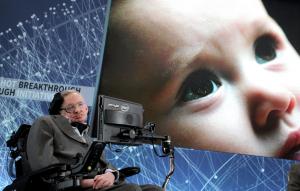April 10 (UPI) — Two previously unrecognized genetic risks that are significantly associated with amyotrophic lateral sclerosis have been identified by researchers.
Scientists from University of California San Francisco and Washington University conducted the largest genetic analysis of ALS, which is also known as Lou Gehrig’s disease. The New York Yankees baseball star died of the disease in 1941 at age 37. Their research was published Monday in the Journal of American Medical Association Neurology.
The researchers also said they found a risk factor for another neurodegenerative disease, frontotemporal dementia, or FTD, that is involved in a different set of brain functions.
About 6,000 people in the United States are diagnosed with ALS each year, according to the ALS Association. It’s 20 percent more common in men than women and 93 of patients are Caucasian.
The average age of onset is 55 and about 10 percent of those newly diagnosed with ALS survive 10 years or more.
But astrophysicist Stephen Hawking was diagnosed with ALS as a young adult and died at age 76 on March 14 in Cambridge, England.
Scientists hope that identifying genetic mutations in neurodegenerative diseases in conjuction with the biochemical processes affected by these gene mutations will explain how these diseases develop and how they might be treated.
“This kind of big-data approach can point us in the right direction on where to start for better understanding ALS, which remains poorly understood,” study author Dr. Rahul Desikan, an assistant professor with the UCSF Department of Radiology and Biomedical Imaging, said in a press release.
The disease appears to be different than other neurological disorders, including Alzheimer’s, Parkinson’s and FTD, even though they share the same risk factors with cardiovascular disease.
“In this study we found that ALS is closely related genetically to frontotemporal dementia, but not to any of the other common neurodegenerative diseases, like Alzheimer’s or Parkinson’s,” study author Dr. Rahul Desikan, an assistant professor with the UCSF Department of Radiology and Biomedical Imaging, said in a press release.
In ALS, degeneration of neurons in the frontal region of the brain that controls muscles causes patients to lose motor control, the ability to speak and later the ability to breathe.
Like other other neurodegenerative diseases, abnormal accumulation of specific proteins within neurons appears to play a role. But researchers have been unable to find causes and biological explanation of disease progression.
The researchers took data from studies that included genetic information from 124,876 individuals of European ancestry from 2016 to 2017. The studies included healthy people as well as those affected by ALS, Alzheimer’s, Parkinson’s, FTD, corticobasal degeneration and progressive supranuclear palsy.
The researchers specifically wanted to find genetic variations that appear in different individuals with the disease. They applied statistical methods to identify individual bits of DNA in which mutations or inherited variations may be associated with more than one disease.
A specific variation in a region of DNA containing the gene for microtubule-associated protein tau, which is also known as tau protein, was associated with elevated risk for ALS.
These mutations were previously associated with other neurodegenerative diseases and abnormal tau accumulation has appeared in brain regions affected by Alzheimer’s. A specific genetic variant was identified only with ALS.
They also found a genetic variation associated with ALS and FTD affects production in the human brain of a protein called BNIP1. It was found to be diminished in motor neurons isolated from the spinal cords of ALS patients after death and in study of mice for ALS. These lower levels also were found in the brains of patients with FTD or PSP.
“Desikan has shown the remarkable capacity to explore huge data sets, using novel data mining and statistical approaches that are uncovering our individual risks for different neurodegenerative disorders,” study co-author and FTD expert Bruce Miller, director of the UCSF Memory and Aging Clinic, said.

COMMENTS
Please let us know if you're having issues with commenting.